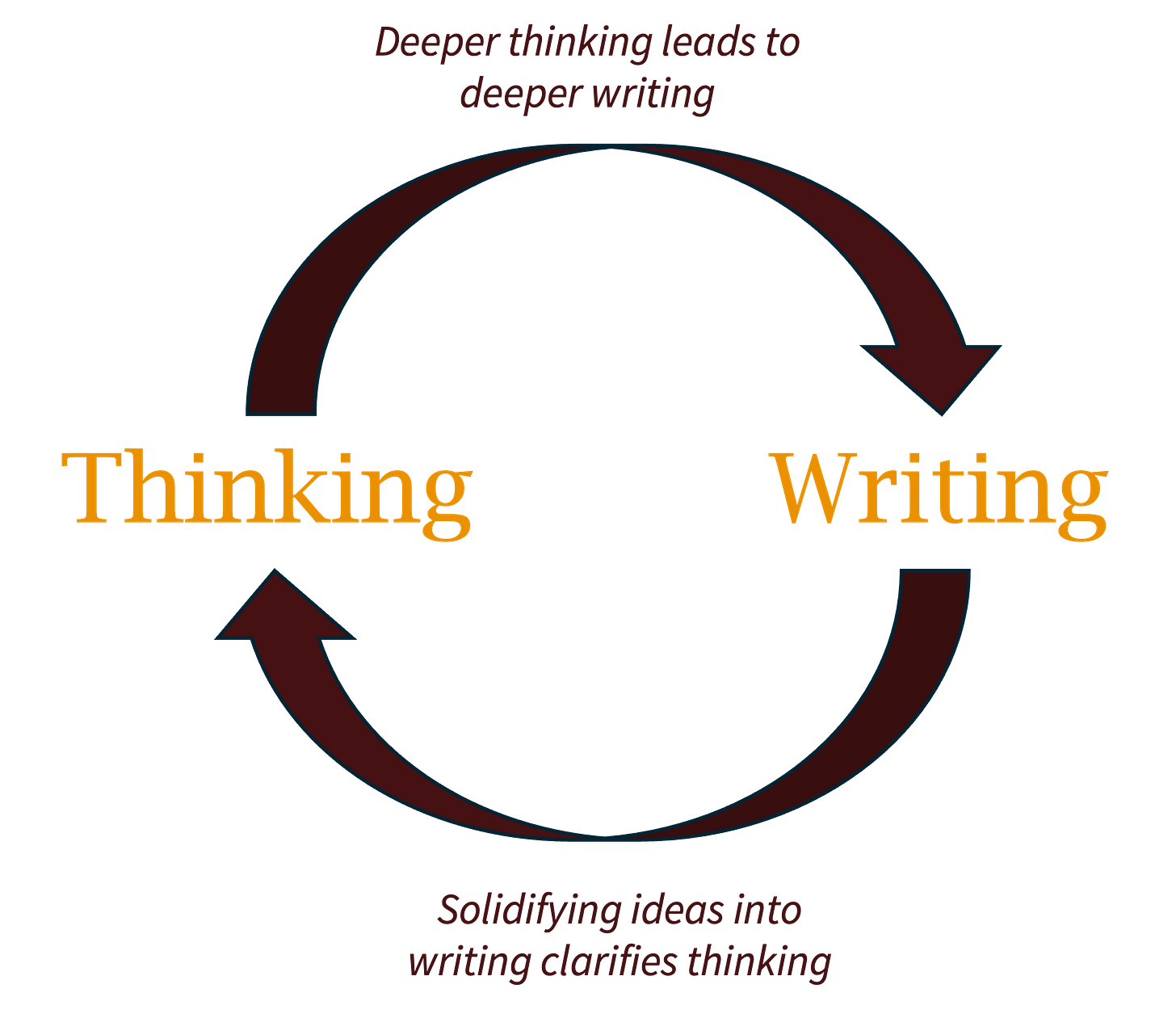I’ve spent the last couple of months buried deeply in the topic of AI and writing as I explore a new venture around the future of knowledge work. A lot of thought needs to go into building the best possible interfaces for the written word in an AI (or even AGI) world, and big questions arise over what tool design should look like to forge the best relationships between writers, thinkers, and AI. I wanted to share a little about why I personally think this is an incredibly important thing to be working on.
Writing as a fundamental practice
Writing is about more than putting words on a page, it’s a means to create clarity of thought, and a tool to spread ideas that can rally millions and move mountains.
Since writing emerged amongst humans, it has been the primary medium of communication and collective organising. Without writing, we wouldn’t have the scriptures that enabled mass religions, the collective stories that created and held together empires and nations states, the laws that guide our daily lives, the fictions that have spurred the imagination of billions, or many other binding facets of the modern world.
One of the biggest shifts for humanity rocketing into the future was a transition away from oratory tradition towards that of the written word. Obviously, therefore, writing is a huge deal.
A very funny literal prompt response where I asked ChatGPT to give me “a caveman writing words on a wall”
And yes, we now live in a far more multi-media world - with audio, images, and video (all of which are now also massively affected by AI, as the image above demonstrates) - however, I believe writing is still the way by which many of the biggest ideas are formed and shared. Books, blogs, reports, and papers (not to mention Tweets…) all shape our lives daily. These are still the accepted foundation of knowledge that we draw upon to collectively build. Even in other mediums, any new business plan, media campaign, or movie script are all written before actioned.
However, writing isn’t just about communication, it’s about generating clarity of thought. This act of putting words on paper is how many of us still decide what we believe, what is true, and how ideas connect.
Understanding the future role of AI in this process is, therefore, fundamental in many ways to understand the future role of AI in human thinking and organising overall (something I’ve written a little bit about before).
AI and writing
The biggest breakthrough for AI in modern times has been the rise of generative technology spurred on by Large Language Models (LLMs). The predictive models that churn out tokens (words) in the right order (most of the time) and sound eerily human (ish).
This rapid evolution has accelerated people’s estimations of when we might have human-level intelligent machines and pretty much turned the world upside down. Businesses, governments, civil society, academia, the public, and every other part of society is now imagining its future with this technology in it - re-thinking what it means to exist when humans are no longer the dominant intelligence.
Generative AI can now write ‘better’ than the average human’s attempt - creating slick prose that would impress many. This has of course opened the flood gates on explorations and use of generated text and, subsequently, a sea of products and tools forming around in - both in bespoke writing tools, but also integrations into legacy products like Word or Google Docs.
The ability for generative AI to write at such a comparatively high calibre has, of course, worried many in publishing, academia, media, education, and more about a future of knowledge work where AI output reigns supreme and an over-reliant population has lost their critical thinking and communication skills. Researchers from Microsoft and others have started exploring this future and I think it’s something we should seriously consider as we build this future - this is exactly why intentional design of this new era of tools is paramount.
One critical way to view AI as an enhancer, rather than depleting force, of thinking is to reimagine of this technology as not just a content production tool, but a cognitive one. Many thinkers, writers, and knowledge workers I speak to want AI as a ‘thought partner’ - a tool to not just write everything for them, but help them be better thinkers and communicators themselves. They want a tool that can challenge their assumptions, accelerate clarity of opinion, and create opportunities for new ideas, information, and approaches to emerge. In a previous blog, I framed this as ‘AI prompting you…’.
Personally, I have no doubts that the place, structure, and practice of writing in society has just changed forever. In exactly which ways, remain to be shaped.
The products that will emerge
It’s becoming clearer which sort of products will emerge from this shift, with a somewhat open question about the fate of new ventures and the companies that have shaped this space for so long. I have some thoughts on what I think is most exciting.
Foundation models as products: we’ve already seen shifts from the frontier labs as they attempt to productise their foundational technology and capture more of the consumer market e.g. OpenAI Canvas and Claude Artifacts, that enable you to see the text you’re working with next to the chat. This is very cool, but in my opinion these tools give little control, put a huge emphasis on writing and re-writing everything for you, and, subsequently, force writing to sound AI generated… It would be ignorant to say these won’t get better, but I’m not sure they’ll ever meet the needs of people who really want to be deeper in the process of thinking deeply and writing thoughtfully.
Content generators: this is an existing market and these tools will be evolutions of the content generators we’ve had for the last few years (but probably better, with more startups breaking in). This will be good for teams who care primarily about quantity of output, but less so those focused on unique approaches or deep quality.
Legacy tools with retroactive add-ons: tools like Word or Google Docs have all been pushing generative AI into the products. Most are just the same tool with a chat box on the side - ok for some stuff, but (in my view) pretty limiting. For example, right now these tools mostly just generate text for you and allow you to insert it somewhere into the doc; beyond that, they struggle to give advice or information in very actionable ways which makes their usefulness stunted.
AI-native word editors: word editors with AI designed in from the ground-up is where I think we can expect the biggest breakthrough on quality processes, user-satisfaction, and overall writing. To take advantage of the many new possibilities of genAI, we need to reimagine the interfaces we use for these tasks. There will be a transitionary phase where many tools still have the basis of the editor we all know, but I think over a relatively short period of time we will start to reimagine interfaces altogether for this new era. New tools with new workflows mean we can natively include novel genAI offerings in ways that intuitively make sense.
Elements I’m excited about
Based on my own experiences and the many conversations I’ve been having with writers and thinkers, here are some of the feature and capabilities I’m most excited about:
Reflection: help people reach clarity around what they think and believe much faster, in more depth, through questions and conversation
Exploration: help people imagine alternative avenues, possibilities, angles, and connections across ideas to open new possibilities
Role-play: the ability for AI to simulate inputs and opinions of an archetype or audience to bring some proxy of an outside perspectives into people’s writing
Debate: help people test the durability of their arguments under scrutiny and gain greater clarity and confidence
Research: massively increase the amount of information that people can access about a topic
Analysis: bring in multiple different inputs and easily navigate across them to analyse in new ways for better sense-making
Editorial advice: provide editorial advice on angle, tone, approach, clarity, and so much more, to support optimal communication
I’ve explored quite a few of these in a previous piece about ‘sense-making’ AI on the whole.
If done correctly, this will be huge. People write every single day, so the tools we develop here will have outsized impact on people’s lives and society at large as we navigate a world of AI. There’s a real opportunity here to explore better ideas, better stories, better policies, better laws, better strategies, and so much more.
Whilst the writing tool market happens to be dominated by the big players ruling the rest of AI - e.g. Microsoft has Office and is also a primary investor in OpenAI, whilst Google owns Google Suite and bought DeepMind back in 2014 - I think there’s a great opportunity to disrupt these players and bring in new, more innovative approaches to AI integration that don’t rely on legacy foundations. Whilst they have an advantage on distribution, their ability to rapidly test and change products is limited. The innovator’s dilemma could once again be on the side of new organisations and we could make sure the future of AI and writing is an empowering one.



